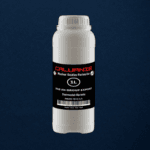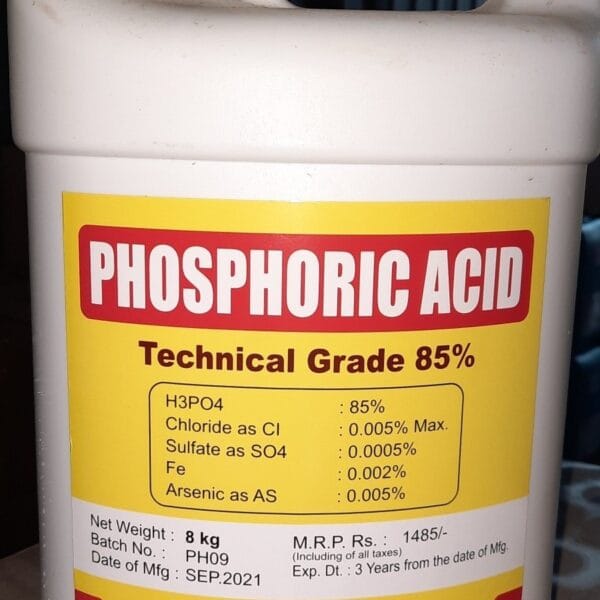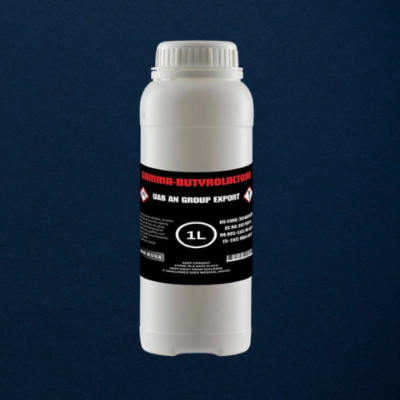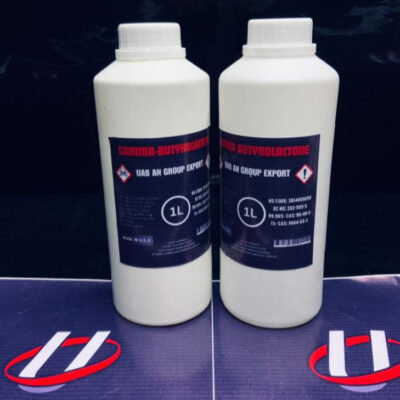Phosphoric Acid
£4,000.00
Phosphoric Acid (H₃PO₄) is a versatile inorganic acid used extensively in agriculture, food processing, water treatment, and as a cleaning agent. It is vital in fertilizer production, improving plant growth, and is also used as an acidulant in beverages and food products.
Description
Phosphoric Acid: Uses, Properties, and Applications
Phosphoric acid (H₃PO₄), also known as orthophosphoric acid, is a highly versatile and widely used inorganic acid. It plays an essential role in multiple industries, from agriculture to food and beverage manufacturing, thanks to its acidifying and cleaning properties. It is commonly found in products such as fertilizers, detergents, water treatment chemicals, and even as a food additive in cola drinks. Phosphoric acid has a wide range of applications due to its ability to act as a catalyst in chemical reactions and its effectiveness in pH adjustment and corrosion inhibition.
What is Phosphoric Acid?
Phosphoric acid is a mineral acid that is typically found as a colorless, odorless, and viscous liquid. It can also be a crystalline solid in its pure form, though it is usually encountered in an aqueous solution. This acid is produced by reacting phosphorus pentoxide (P₄O₁₀) with water. Phosphoric acid’s chemical formula is H₃PO₄, and it is considered a triprotic acid, meaning it can donate three hydrogen ions in solution.
Phosphoric acid is a moderately strong acid, though not as potent as sulfuric acid. It is highly soluble in water and is usually available in concentrations ranging from 85% to 100%. Its properties make it useful in a variety of applications, particularly where a controlled pH is needed, such as in the food and beverage industry, and in agricultural fertilizers.
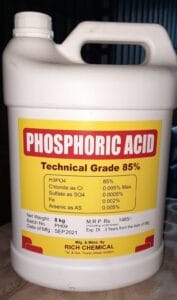
Key Uses of Phosphoric Acid
- Fertilizer Manufacturing: One of the most significant uses of phosphoric acid is in the production of phosphate fertilizers. Phosphoric acid reacts with phosphate rock to produce phosphates, a critical component of fertilizers that enhance plant growth by providing essential nutrients.
- Food and Beverage Industry: In the food industry, phosphoric acid is used as a food additive (E338) to acidify soft drinks, particularly colas, and to improve flavor balance. It’s also used in some processed foods to prevent spoilage and discoloration.
- Water Treatment: Phosphoric acid is used in water treatment processes, where it helps in adjusting the pH of water and aids in removing mineral scale and deposits from pipes and equipment.
- Cleaning and Metal Treatment: Phosphoric acid is commonly used in cleaning applications, especially for the removal of rust and corrosion from metal surfaces. It is also involved in passivating stainless steel, providing a protective coating against corrosion.
- Pharmaceutical and Cosmetics: In the pharmaceutical industry, phosphoric acid is used in various applications, including as a pH adjuster in liquid medications and as a component in some dental materials. Additionally, it is found in some cosmetic products for its exfoliating properties.
Chemical Composition and Properties
- Chemical Formula: H₃PO₄
- Molecular Weight: 97.994 g/mol
- Appearance: Colorless, odorless liquid (aqueous solution) or crystalline solid
- Density: 1.885 g/cm³ (for 100% solution)
- Melting Point: 42.35°C (anhydrous)
- Boiling Point: 158°C (for aqueous solutions)
- Solubility: Completely soluble in water
Specifications and Features
- High Purity: Typically available in concentrations ranging from 85% to 100%, suitable for various industrial applications.
- Acidic Properties: Strong acid used for pH adjustment, corrosion inhibition, and as a catalyst in chemical reactions.
- Versatility: Used in agriculture, food processing, water treatment, and as a cleaning agent.
- Solubility: Highly soluble in water, making it easy to dilute for specific applications.
- Safe Handling: While relatively safe in dilute solutions, concentrated phosphoric acid should be handled with care due to its acidic nature.
Conclusion
Phosphoric acid is a vital chemical compound with diverse uses in various industries. Its role in agriculture, particularly in fertilizer production, underscores its significance in enhancing global food production. Beyond its agricultural uses, phosphoric acid’s presence in the food and beverage industry, as a cleaning agent, and in water treatment highlights its versatility. As industries continue to rely on this acid for several applications, proper safety protocols must be followed to ensure safe handling and use.

